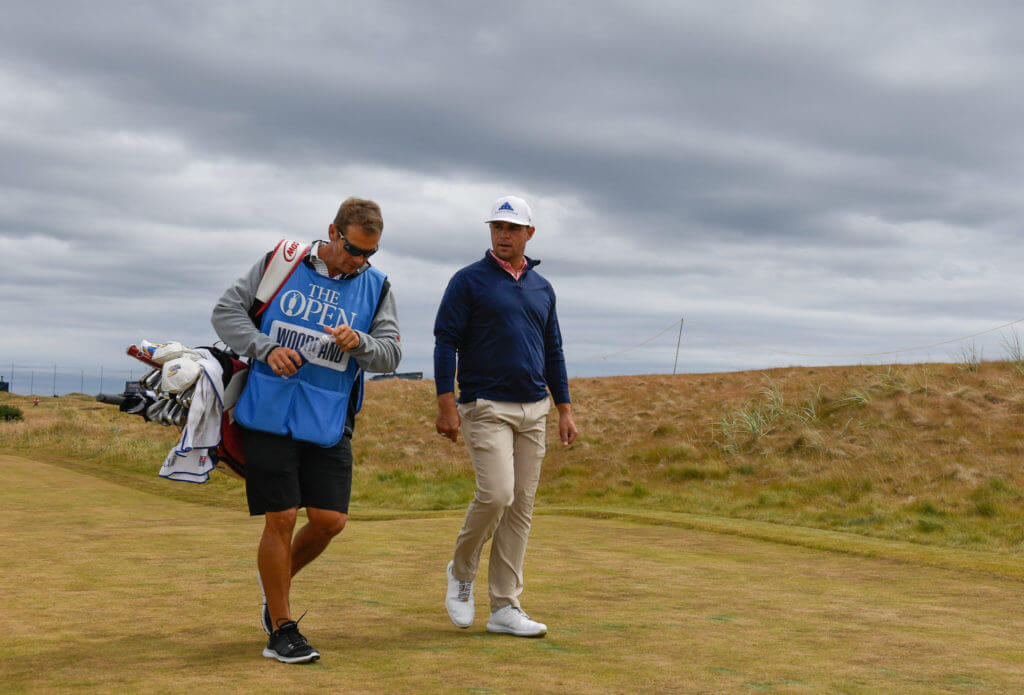
It doesn’t get any tougher for a caddie than British Open week. You’re charting and mapping a course you probably haven’t seen in 10 years, if ever, and there’s a strong possibility it has been lengthened since the last time you saw it. Once the tournament starts, the challenge becomes immense. Wind direction. Wind strength. Ground texture. Green firmness.
Did you bring the weather gear?
Where’s the umbrella?
What happens if the yardage book gets soaked?
Is the scorecard dry? We have to be able to read the numbers….
RELATED: Caddie photos from the Open Championship | Q&A with Ronan Flood
All of these factors obviously can come into play at any PGA Tour event, but there’s a much greater likelihood they’ll become part of the equation in the United Kingdom. It’s basically a calculus exam written in Arabic — educated guesswork in a cat-and-mouse battle with Mother Nature and the golf gods.
Numerous British Opens stand out for the conditions in which they were played. The first that comes to my mind was at Muirfield in 2002, specifically the third round, which began in perfect weather before succumbing to what was basically a Scottish hurricane for much of the afternoon.
“It’s the only time in my life that I can honestly say I wasn’t prepared on the golf course,” Padraig Harrington said. “It was the worst weather I’ve played any competitive golf in.”
The most notable casualty was Tiger Woods, who had won the first two major championships that year and remained in realistic pursuit of the Grand Slam through 36 holes at Muirfield. Woods was two strokes off the lead but bore the brunt of the worst stretch of wind and rain, shooting an 81 that knocked him out of contention.
Not in a thousand years would a tour event have continued without interruption in America. “I remember seeing Tiger when he was about to tee off,” said caddie Ricci Roberts, who was on the bag for winner Ernie Els. “His eyes were as big as saucers, like, are you kidding me? We’re going to play golf in this?”
Harrington’s second British Open title in 2008 came in weather that was consistently difficult all week — the Irishman finished at 3 over par and still won by four. Of all my trips covering the tournament, ’08 was the only time my own golf clubs never left the trunk of my rental car.
The final round in 1995 was another beauty. John Daly’s astonishing playoff victory over Costantino Rocca came on a day when the breeze blew hard enough to halt play — balls were moving on the greens. As good as Daly was all week, he probably wouldn’t have come close to winning without caddie Greg Rita, whose knowledge of St. Andrews and handling of the big fella might have been worth six to eight strokes over the span of the week.
When Rocca’s improbable hole-out from the Valley of Sin forced extra holes, Rita hustled off to grab Daly’s clubs but couldn’t find his yardage book. Mark Brooks supplied a backup, however, and Daly clobbered Rocca in the four-hole overtime session. Rita was heralded as the mastermind behind the unlikely triumph, although caddies, like referees, are the target of blame more often than the source of success.
Consider the 2001 British. Ian Woosnam, who held a share of the lead one hole into his final round, was penalized two strokes for accidentally carrying a 15th club. The British media would jump all over Miles Byrne for the mistake, saying the caddie had cost Woosnam a claret jug, a rather strong accusation given that the Welshman had 17 holes left and would ultimately lose to David Duval by four.
Woosie didn’t exactly rally to his man’s defense. “God, I give you a job to do and you can’t do it,” he sniped to Byrne.
Then there’s the 1999 British, played at Carnoustie, site of this week’s festivities. Jean Van de Velde’s 72nd-hole collapse has gotten lots of attention lately, and Christophe Angiolini, his caddie at the time, paid a heavy price for the meltdown. Van de Velde fired him three weeks later, although Angiolini didn’t blast a driver right of the 18th fairway, clang a 2-iron off the grandstand or chop his third into Barry Burn.
A three-stroke lead that had taken four days to accrue was gone in 15 minutes. Lots of fingers were pointed at Angiolini for not taking the driver out of Van de Velde’s hands. “Not fair,” the caddie told the New York Post last year. “Easy to say, but not easy to do.”
Kind of like golf itself, which is why you don’t blame the guy on the bag for bad shots and missed putts. It’s called accountability.